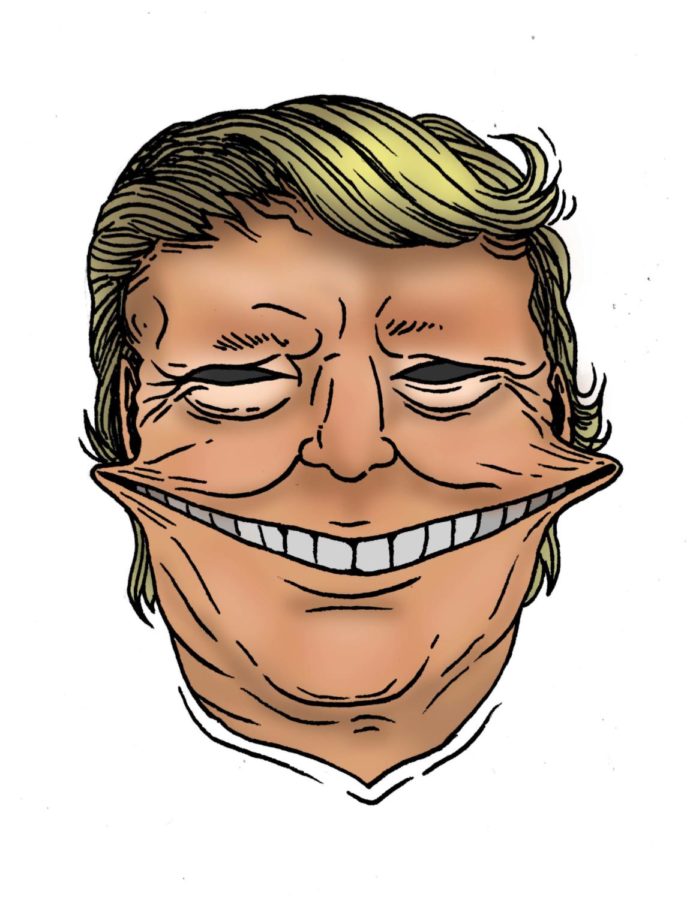Opinion | Trump’s unpresidented response to impeachment
October 8, 2019
I’ve boasted a sticker on my water bottle that reads “Impeach Trump,” adorned with a peach sporting an all-too-familiar toupee for the past two years. This often felt like wishful thinking, until House Speaker Nancy Pelosi, D-Calif., announced a formal impeachment inquiry on President Donald Trump last week.
Being investigated are accusations that President Trump pressured the president of Ukraine to investigate former Vice President Joe Biden, the current front-runner in the 2020 Democratic primary. These allegations arose days after Trump froze more than $391 million in aid for Ukraine.
While the impeachment inquiry in itself was surprising to many, Trump’s reactions, in true form, have been anomalous compared to the precedent set by previous presidents. While Trump is not the first president to face this political battle, his reactions thus far fall in uncharted territory.
Trump’s actions only further incriminate him and should strengthen the argument for his removal, but he seems to have no idea what a mess he has gotten himself into. At this point, Democrats have little left to do in order to impeach Trump — he is largely doing their job for them. His refusal to back down and continued self-incrimination make his behavior both unprecedented and unpresidential, making it near certain the House will impeach him, and making it harder for the Senate to justify an acquittal.
On the White House lawn on Oct. 3, Trump publicly called for China to investigate the Bidens – this time publically committing the action for which he is being investigated. Federal law indicates that it is unlawful for a person to “solicit, accept, or receive a contribution” from a foreign national in connection with a federal, state or local election. Regardless of what the impeachment inquiry finds in relation to the Ukraine scandal, it seems Trump openly broke federal law in this media stunt.
This strategy is radically different from that of former President Bill Clinton, who is the president to most recently face a similar battle. The House approved two impeachment articles surrounding his affair with Monica Lewinsky and respective coercion and perjury in the 1998 trial. The Senate acquitted him of all charges a year later.
The Clinton administration took a tight-lipped approach with the media during the trials. Every member of the White House staff, including Clinton, was instructed not to make any comments concerning Lewinsky, the scandal itself or the impeachment hearings.
While an impeachment from the House is a less than optimal outcome, Clinton’s calm and quiet strategy allowed him to avoid self-incrimination and ultimately resulted in a formal acquittal from the Senate. By not following Clinton’s example, Trump is pretty much setting himself up for failure.
Besides Clinton, only one other president, Andrew Johnson, has been successfully impeached, although it is commonly assumed that had Nixon not resigned in light of his Watergate scandal, he would have faced a similar fate. While both Andrew Johnson and Bill Clinton were formally acquitted by the Senate and not officially removed from office, their respective impeachments had a lasting stain on their careers. Thus far, Trump has only encouraged lawmakers to sentence him to a similar fate.
On Instagram, Trump posted a map of the county-by-county results of the 2016 election, reading: “Try to impeach this.” Unfortunately for Mr. Trump, it inaccurately depicted several counties that went blue as part of Trump’s electorate and fails to account for population density. Regardless of its factual inaccuracy, this is an incorrect and risky mindset, especially when considering that to avoid impeachment from the House, Trump must flip several Democratic representatives. Daring them to hand down an impeachment could certainly backfire.
It’s wholly unclear why Trump thinks a strategy of testing the Democrats’ commitment to impeach has merit, but it seems this behavior is an attempt to play into his existing base, which has historically cheered his reckless behavior and confrontational remarks. However, this is a dangerous game for the president, as he appears to have little perception of just how much of the country supports him.
Trump’s national approval rating is teetering just above 40%, a minority that paints a very different picture than the map Trump is going off of. For reference, Bill Clinton had a 71% approval rate directly after his public denial of the Lewinsky scandal. The most recent polls show 46.5% of Americans support impeachment while 44.8% do not. Ultimately, it is not up to the American people to decide Trump’s fate, but it’s increasingly clear that he has a deeply misguided impression of how Americans view these antics.
While Americans’ feelings towards Trump have little impact on his possible impeachment, the sentiments of lawmakers do carry immense weight. Since House Democrats have the votes for impeachment, Trump must convince Republican Senators in particular to save him from removal from office. But as New York Times White House correspondents Maggie Haberman and Annie Karni put it, Trump is attempting to win this battle himself.
“Mr. Trump has long believed that he is the best communicator in the White House, but as the presidential campaign picks up its pace and the prospect of his impeachment becomes more real, he seems to be its only empowered communicator, a one-man war room responding to developments almost hour by hour,” Haberman and Karni wrote. “And that is making many Republicans anxious.”
President Clinton, on the other hand, took a more partisan approach. While some House Democrats originally chastised Clinton, taking issue with his argument that the scandal was a solely private matter, Clinton gave Democrats a middle ground for defense with his public apology. Democrats were able to condemn Clinton’s actions, while arguing they were not impeachable.
Conversely, Trump has admitted discussing the Bidens with Ukraine and urged China to intervene on camera, claiming he has a duty to do so. This puts Republicans in an awkward position, where they’re either forced to agree that international interference is permissible — which, according to federal law, it is not — or turn against the leader of their party and a majority of their peers. Trump’s “my way or the highway” stance makes it incredibly difficult for Republican lawmakers to stand by him in a moral way.
If Trump actually plans on surviving this storm, he should be taking this threat seriously. Previous presidents have avoided removal from office, and if Trump wants to meet a similar fate, he should follow their example. It’s utterly baffling that Trump is simply viewing this inquiry as another political battle, when this could very well be the nail in the coffin of his ineffective and massively destructive presidential career. As much as he would like, this issue will not simply go away by doubling down or isolating his party. By doing so, Trump is playing a dangerous strategy in this career-defining game.



